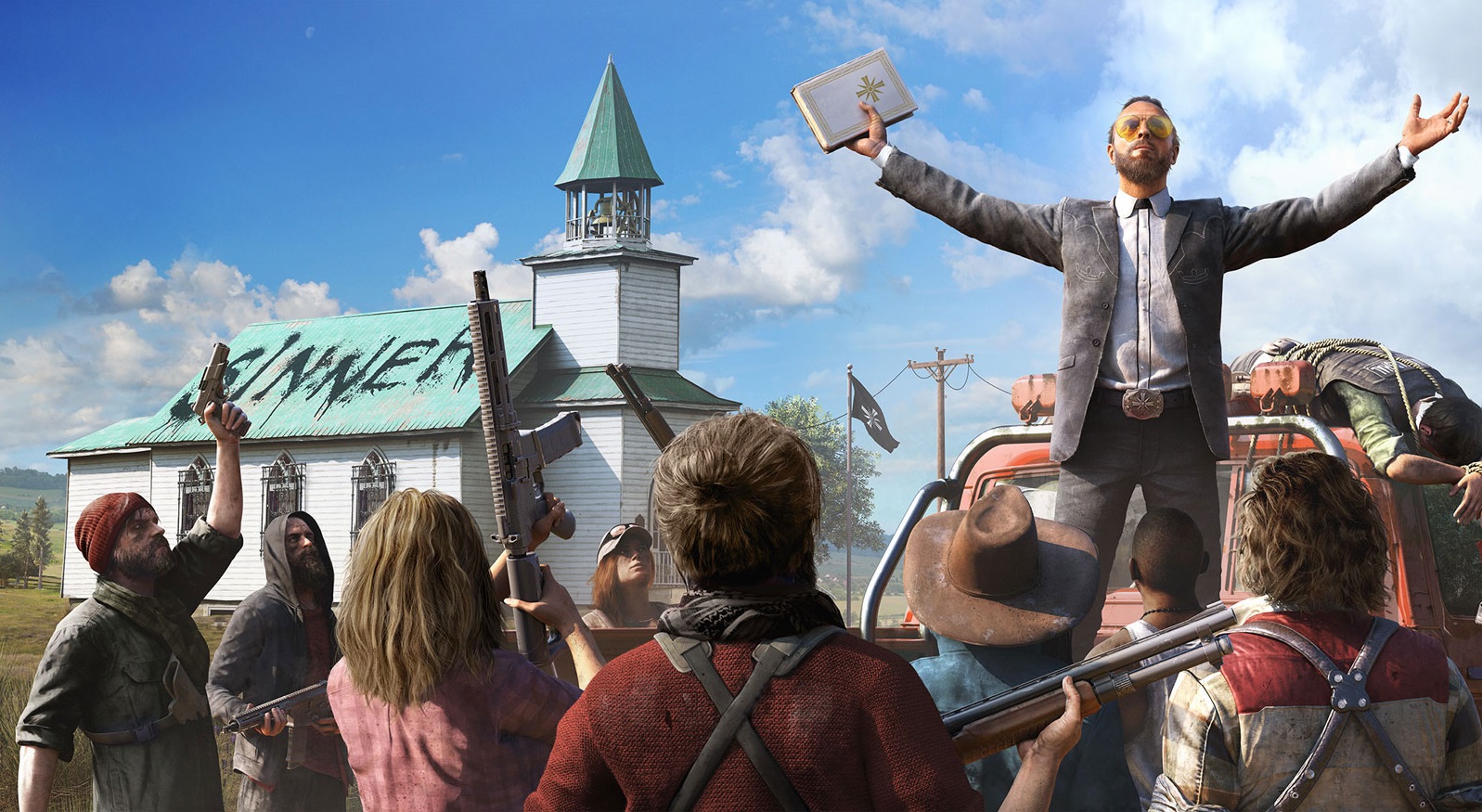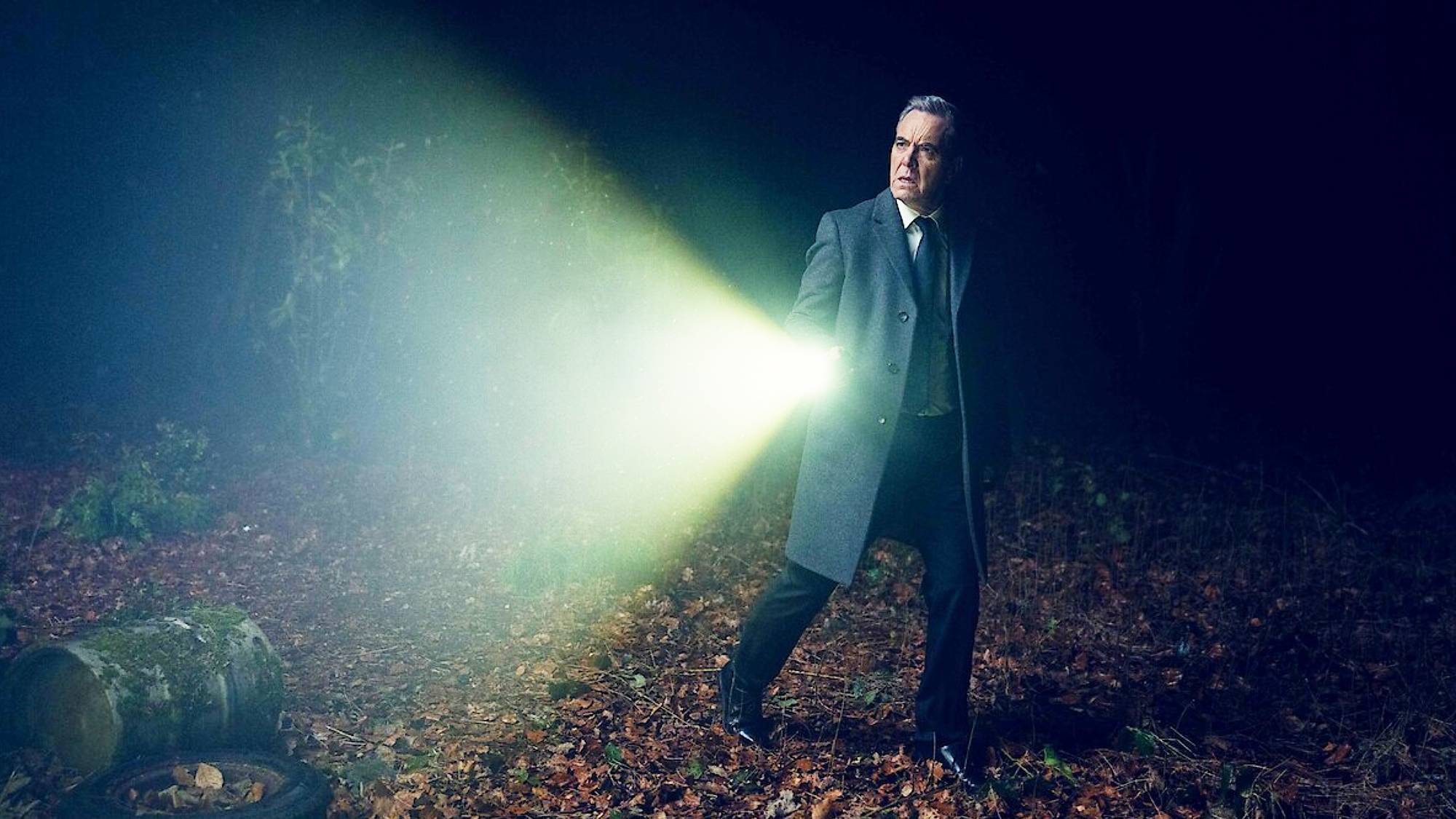Far Cry 5 Takes Aim at American Cults and Militias
Far Cry 5 may be pure video game fantasy, but there’s a germ of something sinister from real life in it.
Far Cry is a series that takes players to the far corners of the globe, where they encounter both the beauty and the brutality of local cultures. Now that the games have explored Oceania (twice!), sub-Saharan Africa and the Himalayas, the developers have decided to turn inward. In Far Cry 5, the franchise’s critical eye rests on none other than the American heartland. With its guns, religion and political ideology, it’s not nearly as safe a place as it might appear, the game implies.
I attended a press briefing to discuss the latest Far Cry title, but it didn’t have the jovial atmosphere of most gaming events I’ve been to. As I sat down, watched the footage that Ubisoft had prepared for us and listened to executive producer Dan Hay recount his experiences researching the game, I couldn’t help but feel a little uneasy. Far Cry 5 may be pure video game fantasy, but there’s a germ of something sinister from real life in it. If it works, it might not just be a good game, but an important one.
Political origins
Far Cry 5 takes place in the fictional community of Hope, Montana, and it pits the player against an idiosyncratic and ruthless cult known as Eden’s Gate. Hay said he and his team first discussed a rural-America Far Cry near the end of Far Cry 3’s development, but in truth, the inspirations go back much further than that.
MORE: Best PC Games to Play Right Now
Hay, a Canadian, grew up during the Cold War, and cited a period from 1982 to 1987 when it seemed that the threat of nuclear war was not only credible, but inevitable. In 2007, the subprime mortgage crisis demonstrated that American civilization’s economic foundations were not as rock solid as they had appeared to be. Under the right circumstances, it seemed like the United States could skirt an uncomfortable line of lawlessness.
Even as Hay worked on the game in 2016, the political climate kept shifting. An armed militia in Oregon seized a government building and occupied it for more than a month. Brexit demonstrated an “us vs. them” mentality in the United Kingdom. And the U.S. presidential election made Americans feel more divided than ever.
From the political confusion in American society today, Hay hopes to create both “beauty and chaos” in Far Cry 5.
Get instant access to breaking news, the hottest reviews, great deals and helpful tips.

Anatomy of a cult
Hay said there are three things,that define rural American disaffection and isolation: “Freedom. Faith. Firearms.” Tell a certain strain of Americans that their liberty — particularly their religious liberty — is under threat, and they will ready themselves to defend it with guns, he said.
Far Cry 5 takes that attitude to its logical extreme in Eden’s Gate: one part apocalyptic Christian cult, one part reactionary militia. To make the group into a credible threat, Hay and his team researched real-life American cults such as Heaven’s Gate, and consulted with experts in cult psychology.
While the popular conception of a cult is a group united under one authoritarian figurehead, Hay explained that in real life, power and responsibilities are more often divided among a handful of leaders. Each one serves a different purpose. In Far Cry 5, those leaders are Joseph, who believes he is a prophet sent to save a sinful Earth; Jacob, his steadfast eldest son; John, his overeager youngest son; and Faith, his mollifying daughter. Each antagonist fills a specialized role in Eden’s Gate, and each will present a unique obstacle for the player.
While the Far Cry series has never shied away from political, racial and religious themes, there’s no denying that Far Cry 5 promises to speak to some very timely fears about American society.
Open-world alliances
Although the setting is what will probably define Far Cry 5, for better or worse, Hay wanted to emphasize that the franchise’s signature open-world first-person-shooter gameplay will still take center stage. You can explore Hope in its entirety, from its bars and shops to its water towers and armed militia compounds. How you tackle the game — even the order in which you liberate some of the areas from the cult leaders — is up to you. Naturally, there will be a variety of weapons, vehicles and allied nonplayer characters to help you do it.
I spoke to Hay about the delicate balance between openness and difficulty. After all, if you can go anywhere and do anything right from the beginning of the game, how can the game still feel challenging later on if there’s no defined progression?
“It’s a dynamic game that pushes back,” he said. “The difficulty ‘ramp’ feels right.” He explained that in a typical mission, you might have to solicit information, build up your resources and gather allies before mounting an assault. As such, enemies in the game will learn a thing or two about your capabilities, and other parts of the world will respond accordingly. Hay didn’t want to dive into specifics just yet, but it doesn’t sound like Far Cry 5 will be boring.
We didn’t see too much of Far Cry 5’s gameplay at the event, but what was there looked pretty familiar: explore big, open areas; gather up an arsenal of weapons; rally friendly characters to your side; and take down crack-shot enemies who make ample use of vertical terrain.
Big Sky Country
Just how much of Far Cry 5 is based on real life, and how much is conspiracy-thriller fantasy? Hay told me that his research into cults and militias had made a profound impact on both his viewpoints and his lifestyle. Hope, Montana, may be a fictional place, but groups like Eden’s Gate are very real. Whether they will ever erupt into violent conflict is anyone’s guess, and depends a lot on how the American political climate shapes up over the next few years.
“It’s difficult to say how much modern events influenced Far Cry 5,” Hay told me. “The game is not specifically about who’s in power. It’s about a feeling, here and now, that something is wrong.”
An unsettling thought — but who ever said that video games had to be reassuring?

Marshall Honorof was a senior editor for Tom's Guide, overseeing the site's coverage of gaming hardware and software. He comes from a science writing background, having studied paleomammalogy, biological anthropology, and the history of science and technology. After hours, you can find him practicing taekwondo or doing deep dives on classic sci-fi.
-
Daekar3 If the determination that leads to the formation of citizen groups dedicated to their own self defense ever leaves us, we will be worse off. All that will be left are the helpless and hapless, and those who don't believe that their lives or their lifeways are worthy of defense.Reply
When you see a militia and the media criticism of its members, ask yourself why each are the way they are. The militia exists out of a spirit of distrust of the government (let's face it, they've earned it) and the will to independence and self sufficiency. The media criticizes them because they represent the establishment, and are members of the in-group whose views and perspectives have been consistently pushed by government at the expense of others.
The specter of unjustified militia violence, particularly in the US, is merely a conjuration to induce fear and the calls for regulations and disarmament that often follow. The ideological foundation of most militias in the USA, however, doesn't actually jive with this perceived threat - they merely want to protect their way of life (that is, to abide by the Constitution and laws that comply with it) and be left alone by a society that is leaving behind both the Constitution and the pretense that laws must comply with it, and establishment that is more and more determined to enforce its views on others in the name of "freedom." -
roblov1 Muslims blowing things up, antifa attacking innocent people, leftists shouting down free speech, but let's go after the cultural midwest.Reply
Makes sense if your goal is to insult your customer base. -
Kallisto_4 So naturally, the "bad guys" are the ones who believe in faith, freedom and the right to bear arms (those clingers to bibles, guns and religion)...the very principal our country was founded upon. There are cults here, that's true. But they are small, inconsequential in numbers and won't last long when the government moves in (David Koresh in Waco). What I have issue with is from the video it appears Ubisoft intends to label mainstream Christians, and anyone who believes in the U.S. Constitution as a "cult."Reply
And who are the "good guys" in this twisted plot? What group will be the savior that will annihilate the Christians; the believers in individual rights and the Constitution; and those who just want an America free from dictatorship? Will I have to play as an agent of a government that has finally fallen to an ideology that suppresses its people and will kill them rather than let them practice their faith in peace or let them have firearms to defend themselves? Or will it be like FC4 where no matter which side you choose the country goes to hell. No thanks.
I've played every Far Cry game there is up until now. How dare they choose to pervert and demonize the one group (and the largest, btw) in America who only wants to remain free from tyranny. I could never enjoy a game where I have to play a role in killing freedom-loving Americans. I'm just worried for all those who won't realize the game is intentionally perverting what those Americans believe and what they stand for. Since it appears that the only religious group being targeted in this game are Christians (crosses, churches, baptisms, etc) I can't help but wonder if the intent of this game is to train and desensitize young people into fearing, hating and killing Christians. I hope I'm wrong.
America has a real enemy (extreme Islamofacism) that has killed thousands of us on our own soil. They have openly declared war upon us and vowed to take over America and the world. They aren't just saying it, they are actively attempting it. Yet, Ubisoft chooses so-called "christians" as the crazy hostiles trying to take over? Such cowards. They know Christians won't be waiting in the parking lot to take off their heads or blow up their cars. Christians and/or those who believe in the Constitution, use guns to defend themselves, not take over the world or kill those who insult them or their God. Sorry Ubisoft, you are on the wrong side of this one and you won't be getting my money.
 Club Benefits
Club Benefits





